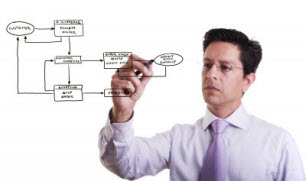 A comprehensive study (An Experiential Study Of Business Simulation Games As A Marketing Learning Method: Training Managers Management Marketing Skills) conducted by Francis Blasco and Mario Martínez Tercero shows the viability and effectiveness of using business simulations to train marketing professionals.
A comprehensive study (An Experiential Study Of Business Simulation Games As A Marketing Learning Method: Training Managers Management Marketing Skills) conducted by Francis Blasco and Mario Martínez Tercero shows the viability and effectiveness of using business simulations to train marketing professionals.
Using advanced marketing learning programs, business games were introduced using the MMTv6 model to prove this method of experiential learning was superior to the currently used methods for training marketing managers.
Based on David Kolb's "Theory Of Experiential Learning", a global business management simulation games study was designed to prove that using the experiential process of playing business simulator games helps marketing managers learn the field more quickly, gain practice and experiences in ways that are not possible with older traditional teaching models.
The authors of the study sought to explain these new methods, to state the importance of understanding their findings and to show definitive superior results obtainable through using this training approach of utilizing business strategy games.
The study corroborates previously impressive findings by using fifth-year communication students from the School of Information Sciences of the Complutense University of Madrid. Random selection of participants was conducted to ensure all control groups were beginning at a level knowledge field. A placement test was used to gauge learning retention. Control groups were given traditional lessons, experimental groups were given business game learning tasks.
According to researchers results, qualified marketing managers need specific skills and abilities to effectively accomplish market related tasks which include having the ability to accurately analyze situations, people and projects. The manager needs to have problem solving skills and decision making capacity.

Managers also need to have a firm propensity for teamwork, interpersonal communication and relationship building. All of these skills proved enhanced when using the business simulation games as an educational tool as well as when using this tool to analyze and assess skills and abilities of potential managers.
Verification processes used by the experimental group was the SPSSv14. These results that confirm the first Basic Hypothesis (BH1) were revealing. Test measurements were based on problem solutions. The value of the solution provided by test participants were measured by amounts of profit acquired by the company based on the decisions made by the student who was playing the business strategy game.
Potential profits reaped due to student solutions showed experimental groups accomplishing amounts around 825 million. Control groups not using the business simulators generated profits in the range of 554 million.
Researchers found that experimental groups rated the training course higher than the students did from the control group. The increase in gained knowledge was also larger from pre-test to post-test in groups using the business simulation games.
The hypothesis were compared using "Perception of Learning" tests which analyzed items connected to the "Reflexive Observation" and "Abstract Conceptualization" stages. Growth for participants in the experimental group was gauged from from the Initial to the final testing showing marked improvement over the control group not using business management games.
Students in non-game control groups only achieved positive results in the sections relating to the organization of information. They also showed low scores when asked to build, then test their own conceptual models or to design experiments that tested their ideas. The traditional lesson method only showed positive gain when applying previously developed theory.
Group results show with the third Basic Hypothesis, similar analysis methods contrast the two independent sample controlled and experimental groups showing the results of specific experience and the active experimentation stages of the testing.
Necessary abilities to become a highly effective marketing manager using simulation games were shown to exceed expectations of higher achievement when using Kolb's experiential learning process.
Are you ready to learn more about business games used in marketing education? Then click here to get started: Cesim SimBrand marketing simulation


